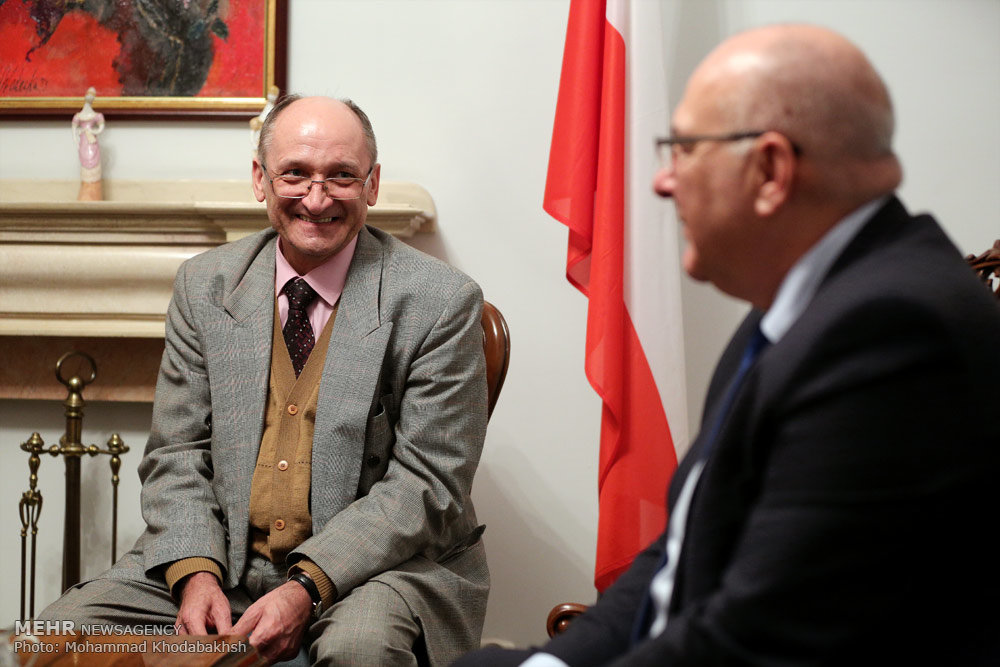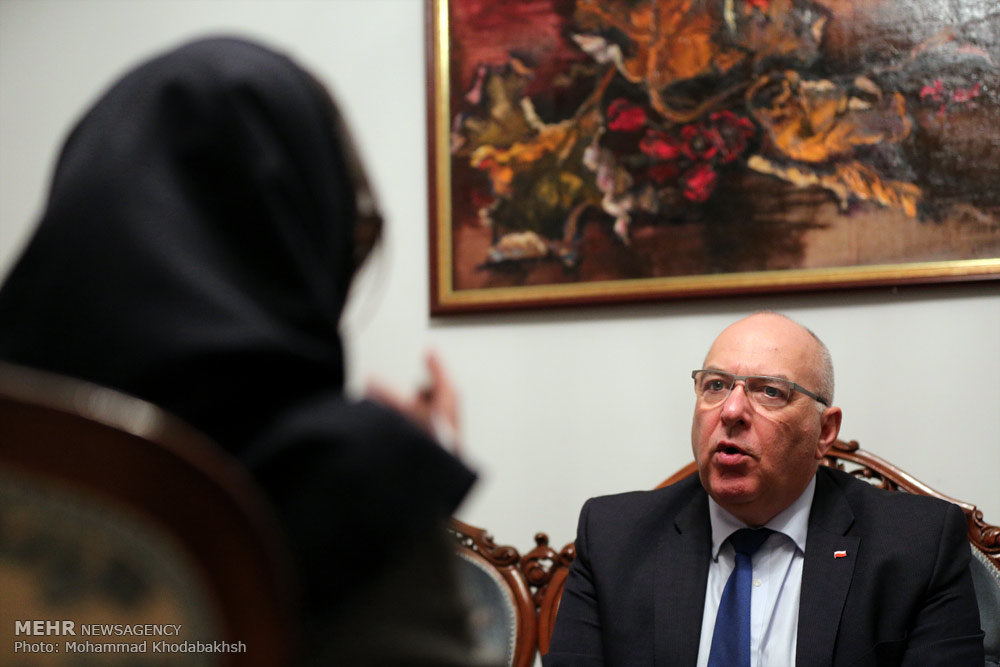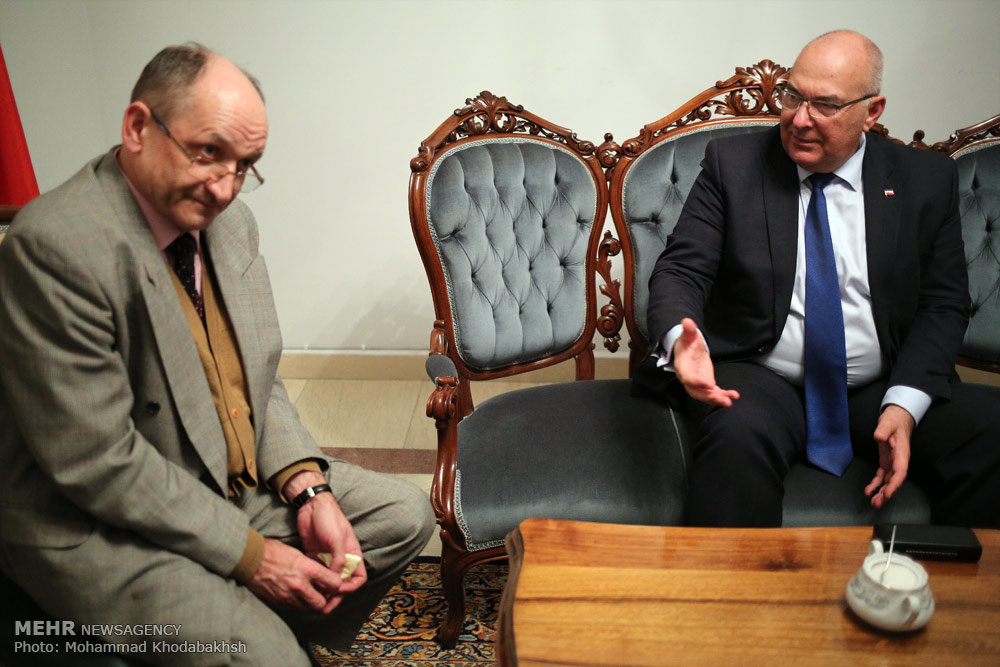A high-ranking economic delegation from Poland visited Tehran on 6 March, 2016, to take part in Iran-Polandís trade forum and hold face-to-face talks with representatives of the Iranian private sector in an attempt to bolster economic cooperation between the two countries following the implementation of the Iranís nuclear deal and the subsequent lift of international sanctions which allowed Iran easier trade transactions with the world.
The Polish delegation was headed by Undersecretary of State at the Ministry of Economic Development of Poland, Tadeusz Ko?ci?ski, and including his counsellor from the promotion and bilateral cooperation department, president of the chamber of commerce, and a number of managers of Polandís major industrial and trade companies active in the fields of mining machineries, industrial lightings, oil and gas equipment engineering, legal services, road and rail infrastructure, ICT, agriculture, and cosmetics.
The English desk of Mehr News Agency sat down for an interview with Tadeusz Ko?ci?ski, Undersecretary of State at the Ministry of Economic Development of Poland, and his counsellor from the promotion and bilateral cooperation department, Krzysztof Dabrowski, in March at Polish Embassy in Tehran.
The following is the full transcript of the interview:
Iranís nuclear deal with the 5+1 group of counties dubbed Joint Comprehensive Plan of Action (JCPOA) came into effect in January 2016, under which many international sanctions against Iran were removed and the Islamic Republicís interactions with the world increased considerably. To what degree would you say the nuclear deal and the subsequent lift of anti-Iranian sanctions have impacted the level of cooperation between Iran and Poland in the past year?
Tadeusz Ko?ci?ski: I would like to go a lot earlier than the nuclear agreement, back to the Second World War during which Polish people who had left Siberia came to Iran. My mother and grandmother were among those. So, Iranians basically rescued the Polish people who had been like the walking dead at that stage after two years in Siberia with no food and clothing, and brought them back to life. After the war, most of them went to the United Kingdom and thatís why I was born in London. Thus, my country always holds a very positive view towards Iran. Whatís more, there has never been any sort of conflict between the two sides and the record has been very positive. Obviously, we were bound by the global treaties and when the sanctions were imposed against Iran, it was very difficult to break the sanctions because the costs of doing so were horrific. Perhaps I could say that we were working in accordance with the letter of the law, and not necessarily with its spirit, which means our hearts have always been with the Iranians.
Now, post-JCPOA agreement was not only positive for Iran, but we also saw a great opportunity for partnership. Similar situations have been previously experienced by Poland in 1989 when we came out of poor economic conditions in which the country had very small capital, suffering from high inflation, high unemployment rate, and lack of know-how. Iran has also been experiencing the same condition. At that time, Poland went through a very successful restructuring of the country and I think we can offer a lot to work together with the Iranians in this regard, in the sense that they can learn from us what worked and what didnít.
Also, our economies are very similar and there is no danger that the economy of one side is ten times larger than the otherís. If one side had a much larger economy, partnership would prove meaningless. Fortunately, we are very similar in size. We also share the same interests in many areas of key specialties such as shipbuilding, pharmaceuticals and mining, which allows us to work together without running the risk of one partner taking over the other.
Geographically speaking, we both come with mutual benefits. Poland is situated in the center of Europe, housing domestically 38 million people but with access to 500 million people in the European Union. I would say we are very similar to Iran in this regard, as you have 70 million people which is nearly twice as big as us, but more importantly, your geographical location provides us with access to the whole Middle East region.

Despite the lift of sanctions and reassurances†coming from the US that trade transactions are now permissible with Tehran, certain obstacles are still stopping Iranian banks from rejoining the global financial system as major European banks remain reluctant to handle Iranian payments. How are the current banking relations between Poland and Iran?
Tadeusz Ko?ci?ski: I would once again point to the very interesting similarity between our two economies; in centrally planned economy, banks were only banks by name, not in the real sense of lending or borrowing money, etc., but as mere offices for distributing funds. Then we went through the change of economy from centrally planned to free market in which we had banks which were not regulated correctly and went bankrupt and lost money of depositors; we had banks in the financial sector which werenít adequately overseen. Thus, we were not helping the economic cycle of the country; so we learned our lessons, and when in 2007-2008 the financial crisis hit the globe and affected most European countries, we were the only country which didnít lose banks and didnít have a domestic crisis because our regulator was very well-prepared. So this is another area of cooperation on which the two countries could work together.
As the Iranian economy is going to be developing, you will need to develop capital market and insurance, which is something that the Polish administration can offer help with and show how we did it, and what we did well, so Iran could learn from our lessons and use our experience to develop its economy.
To achieve this, we have to build an official banking system to support SME (small and medium-sized enterprises) companies, because in Iran as in Poland, the majority of companies are SME, which need special financing but banks donít necessarily know how to finance SME companies. It is very difficult for SME companies to get appropriate finance and this is where we need to work together, so I am hoping and expecting that the Financial Services Authority in Iran will be in contact with the Financial Services Authority in Poland.
If the Iranian financial situation doesnít show any appetite for cooperation, then no Polish bank would come in. Similarly, if the Polish Financial Services Authority has no appetite for foreign exports, then there will be no Iranian banks interested in doing transactions with us. So we need to identify what appetites we have, what kind of banks Ė retails, exports development, infrastructures Ė we wish to encourage. Once we have the two sidesí Financial Services Authorities agreeing on the relative appetites for banks, then we will proceed to the next stage, where the two countriesí Central Banks need to start talking to each other and open accounts for each other. That would allow for a corresponding banking to work, for commercial banks to initially have cross-bank relationships where they can do transactions. In the final stage, we will wait for the commercial banks to take presence: for Polish banks to open up a representative office, hopefully followed soon by a branch in Iran, and similarly for the Iranian banks to have a representative office in Poland and a branch very soon after. That would normalize banking ties, not just for the corresponding banking facilities for documenting and exporting credits, but also financing various projects in infrastructure and so on.

At what stage would you say Iran and Poland are currently standing in respect to banking relations?
Tadeusz Ko?ci?ski: At the very beginning. But it is very important to start at the beginning because we need to make sure that we have the right branch in the right place.
Is this visit going to address the issue on developing banking ties, then?
Tadeusz Ko?ci?ski: Certainly we are seeing many more Iranian companies interested in doing business with Poland and Polish businesses interested in doing business here, so we need to have the financial support, and this is the time for financial authorities to start developing their financial systems.
What is the current level of trade transactions between Tehran and Warsaw?
Krzysztof Dabrowski: The maximum level we achieved in our bilateral commercial relations was $750 million about ten years ago. Then during the crisis, we went down to about $30 million in the size of our exports and about $20 million in the size of imports from Iran, so the turnout in that time was about $50 million. Since the sanctions were lifted, we increased our exports during the last year by more than 80 per cent and we increased our imports by 350 per cent Ė mainly due to crude oil imports from Iran - †so now the turnover is about $300 million. It is half of the record level we had just a few years ago but we expect this level to increase remarkably.
Are there any particular obstacles to investment for the Polish businesses in Iran and vice versa?
Tadeusz Ko?ci?ski: Well, I would say, lack of knowledge is the first one, lack of capital is another. Because both countries are not necessarily cash-rich. The new Polish administration has started reforming Polish export policy. We want to encourage foreign companies to enter our market, just like Polish companies to enter foreign markets, by providing them for example, financing for investing.
At the moment, weíre still at the stage where we have to educate Polish businesses that Iran is a very interesting place to work with. It is not necessarily true that Iran does not have sufficient fund. It is just that some of those funds are in private hands so we look at the concept of getting Iranian private funds to come to Poland, join with Polish governmentís funds and private funds, and then help the investment in Iran, so in other words help the Iranian private funds to leverage on projects back in Iran.

Speaking of incentives, Poland has developed a special program, ĎGo Iraní, aimed to encourage Polish companies to explore trade and investment opportunities in†Iran. What are the various objectives of the program and has it been successful in achieving them since its initiation?
Krzysztof Dabrowski: The program started about two years ago and first it sought to inform our people, entrepreneurs and traders on various possibilities for cooperation with the young Iranian markets, then exchanging trade missions and delegations, then supporting our companies in Iranian markets. Almost every month, or every two months, Polish traders come to Iran and Iranian trade missions visit Poland. So, we are trying to organize symposia and meetings with Polish companies to give talks from business to business. Then, whenever Polish official delegations come to meet with Iranian officials, Polish companies are also invited to join us in the meetings to inform Iranian authorities about the existing problems in trade and trying to solve the problems together and build a special infrastructure.
Tadeusz Koscinski: It is difficult to say a program like Go Iran has been successful or not, because it is not something that would happen overnight; it is not a matter of yes or no. It is actually a way to educate and promote Iranians within Polish communities. Now, we know contracts are not signed to happen overnight; first we have to discover the market, then we have to identify the market requirements, and provide proper financing; so, that all takes time. I think we can say that itís been a success just by looking at the number of people who are coming in. When I talked to our business people, they were all saying that they had very intense, concrete discussions with the Iranian side. They have not come here for holidayÖyet.
Last year, Iranian Foreign Minister Mohammad Javad Zarif headed a delegation to Poland, during which 3 economic MoUs were signed on energy cooperation, investment, and transfer of delegations. What have been the outcomes of those contracts so far?
Krzysztof Dabrowski: During that visit, three important commercial contracts were signed. Just before our visit to Iran, we met with one of the Polish delegations and companies which signed the contracts during FM Zarifís visit last year, and received a positive and very promising feedback. Right now, we are waiting for the reaction from the Iranian side, to start financing the contracts.
Tadeusz Ko?ci?ski:†Financing the contracts is a way for the Iranian government to give reassurances that it is keeping the agreements. At the moment, we are waiting for the Iranian side to take steps in this regard.
Krzysztof Dabrowski: Actually the seminar was quite interesting in that I remember the presence of about 500 companies from the Polish side which was a record in the number of registered companies to attend a seminar during the official visit of the foreign minister. That confirms how big is the interest of Polish companies in Iranian market. And the speech of Mr. Zarif was very promising. New contracts were signed. So the visit was a very important one, and we expect good results.










